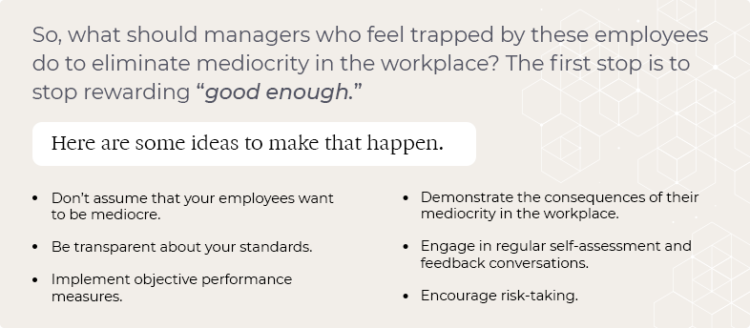Why It’s So Important to Stop Rewarding Mediocrity was originally published on Ivy Exec.

We’ve all had at least one colleague or employee who didn’t quite put their best foot forward. They did what they were asked but didn’t put forth many ideas of their own. Their projects were adequate but did no more than the bare minimum. At five o’clock, they were the first person out the door.
In other words, they were mediocre.
Some employees do their jobs for the paycheck – and for no other reason. These are the team members who do enough to stay employed but demonstrate no passion for their work.
Employees like these are frustrating enough when they’re colleagues; it’s even worse when you’re their manager. It’s difficult to motivate someone who doesn’t seem to want to do their job well.
At the same time, however, letting a mediocre employee continue to put in minimal effort can be demoralizing to other team members. They may lose their own enthusiasm, especially if they have to pick up the slack for a lackluster colleague.
Mediocre behavior also can create a catch-22 for managers. These employees are technically doing enough not to be fired. At the same time, their sloppy work or bad attitudes mean that managers can’t assign them high-stakes or detailed work. If they fail, the manager is left picking up the pieces.
So, what should managers who feel trapped by these employees do to eliminate mediocrity in the workplace? The first stop is to stop rewarding “good enough.”
Here are some ideas to make that happen.

Don’t assume that your employees want to be mediocre.
Leadership and organizational development expert Steven Balzac described how it’s human nature to repeat behavior that is being rewarded, even if it’s bad behavior. So, if mediocre employees are consistently rewarded – be it with keeping their positions or receiving acceptable performance reviews – they may not even know you aren’t happy with their work.
How can managers get out of this habit of ignoring or working around poor performance?
“All too often, we reward the wrong behaviors and encourage in the short term the exact opposite of what we want in the long term. If we want to avoid that, we need to stop periodically and debrief or get an outside perspective on our actions. Otherwise, the behaviors become automatic and unthinking,” said Steven.
Be transparent about your standards.
Sometimes, mediocre performers may be unclear about what you want from them. They may have worked elsewhere where their performance was sufficient. Or, they may be so in the dark about what you’re looking for, they don’t know where to start.
Former military strategist Steve Leonard suggests creating standards and making sure your team knows them is a surefire way to improve performance.
“What does “right” look like? What standard will you accept? Have you done enough to ensure everyone understands the standard? Then you take every opportunity to reinforce that standard. You don’t reward efforts that fall short, you reward those who make the effort to exceed the standard,’ he writes.
Implement objective performance measures.
In connection with this idea, your team needs objective measurements of their performance. Relying only on comparisons with others and unquantifiable standards, rather than on data, can reinforce middling performance.
Performance metrics take the ambiguity out of what success looks like. Some performance metrics that create clear parameters for success may include customer reviews or happiness, quality reviews, sales, profit, ROI, or reputation, to name a few.
Demonstrate the consequences of their mediocrity in the workplace.
If you or other team members are picking up the slack for your mediocre colleagues, they may not see the impact their middling performance has on the organization.
Harvard Business Review’s Joseph Grenny shares an example of a manager who forced his team to live the consequences of their work. The telecommunications IT manager asked underperforming engineers to manage customer calls using the lackluster software they created.
“Those who had these experiences returned and shared stories with their colleagues about the misery they were authoring. In a matter of weeks, the sleepy team had a new alertness about their work — what they were doing and why it mattered,” Joseph said.
Engage in regular self-assessment and feedback conversations.
Employees can become demotivated if all the goals and performance standards set for them are external. What are their personal goals? What would excite them? If personal goals and their job duties are not aligned, this disjunction could cause the mediocrity you’re trying to avoid.
Instead, engage with your team members to set goals and support loftier ambitions. Mediocrity in the workplace can come from being bored at work, or feeling like every task is repetitive. At the same time, these meetings hold team members accountable because they have to self-assess themselves – helping them avoid the trap of doing the bare minimum, rather than striving for self-improvement.
Encourage risk-taking.
Another reason that employees may be completing mediocre work is they believe that’s all you’re looking for. If they think that they can’t color outside the lines, or try new processes, they may be submitting average work because they think you expect it or because business as usual doesn’t interest them.
Instead, fostering a culture of risk-taking can re-energize a demoralized workforce. Experimentation and new ways of thinking/producing should be praised.
Alternatives to Letting Mediocrity in Workplace Slide
There are many reasons an employee could be a mediocre performer. They may be unclear about what they’re supposed to be doing, and, especially if they’ve been taking shortcuts for years, may not even know their work has been underwhelming. Or they could be checked out, believing they have no room to try new processes or work towards their goals.
Whatever the reason, managers shouldn’t simply leave mediocre employees to their own devices. Instead, to re-energize both these poor performers – and the rest of the team – they should implement the tried-and-true strategies above.
Get more tips on productivity and managing!


